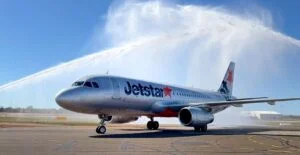Singapore — Jetstar Asia, the Singapore-based low-cost carrier and regional offshoot of the Jetstar Group, will cease operations later this year after two decades of flying, the airline announced on Friday. The decision comes amid sustained financial losses, high operating costs, and an increasingly competitive Southeast Asian aviation market.
The carrier, established in 2004 as a joint venture between Qantas and Singapore-based investors, was once seen as a key part of Jetstar’s pan-Asia strategy. But in recent years, the airline has struggled to recover from the long-term effects of the COVID-19 pandemic, volatile fuel prices, and intense fare pressure from rivals such as Scoot, AirAsia, and Cebu Pacific.
“It is with deep regret that we announce the closure of Jetstar Asia Airways,” the airline said in a statement. “Despite best efforts to restructure and reposition the business post-pandemic, continued losses and market headwinds have made the operation unsustainable.”
The airline will wind down operations in phases, with all flights to cease by October 31, 2025. Jetstar Asia currently operates a fleet of 12 Airbus A320 aircraft serving destinations across Southeast Asia, including Bangkok, Manila, Kuala Lumpur, Jakarta, and Ho Chi Minh City.
Qantas, which owns a 49% stake in Jetstar Asia, said the closure is part of a broader effort to streamline its Jetstar brand footprint and focus on core markets.
“We’ve made a very difficult decision to exit a market that’s no longer economically viable in the long term,” said Qantas Group CEO Vanessa Hudson. “We remain committed to the broader Jetstar network and will explore opportunities to redeploy capacity through other entities.”
A Regional Pioneer Falls Behind
Jetstar Asia was among the first wave of low-cost carriers based in Singapore and played a key role in establishing Changi Airport as a budget travel hub. In its early years, the airline posted modest profits and gained a loyal customer base with reliable service and competitive pricing.
But the rise of dominant regional players—backed by deeper capital reserves and stronger domestic networks—eroded Jetstar Asia’s market share. Efforts to restructure the airline post-2020, including route consolidation and workforce reductions, were ultimately insufficient to restore long-term viability.
Aviation analysts say the closure reflects broader consolidation trends in the low-cost sector.
“Jetstar Asia’s challenges are not unique. We’re seeing a correction in the Southeast Asian LCC space as weaker players exit and stronger ones consolidate market share,” said Brendan Sobie, independent aviation analyst and founder of Sobie Aviation.
Impact on Passengers and Staff
Jetstar Asia said all passengers holding bookings beyond the shutdown date will be contacted and offered full refunds or alternative arrangements with other Jetstar Group carriers where possible.
The airline employs around 600 staff in Singapore, including pilots, cabin crew, ground handlers, and administrative personnel. The company said it will provide support and transition assistance, including placement services and severance packages.
Singapore’s Changi Airport Group expressed disappointment at the decision but acknowledged the competitive and operational pressures facing regional carriers.
“Jetstar Asia has been a valued partner at Changi for 20 years, and we thank them for their contribution to Singapore’s aviation growth,” the airport operator said in a statement.
Jetstar Asia’s closure leaves a notable gap in Singapore’s low-cost carrier landscape and marks the end of an era for one of the region’s early budget aviation pioneers.

